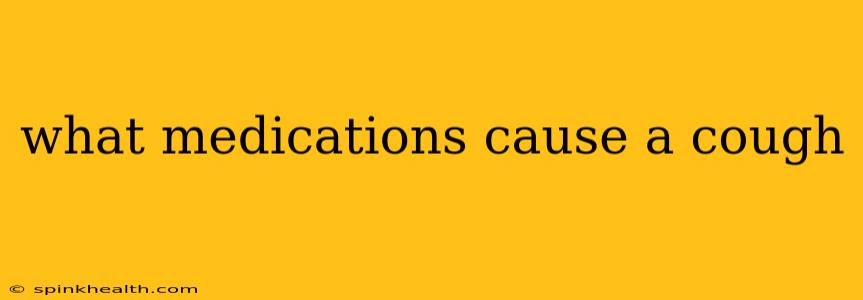What Medications Cause a Cough? A Deep Dive into Drug-Induced Cough
A persistent, nagging cough can be incredibly frustrating, especially when you can't pinpoint the cause. While infections like the common cold or flu are frequent culprits, sometimes the root of the problem lies within your medicine cabinet. Many medications, surprisingly, can trigger a cough as a side effect. Understanding which ones can help you navigate your symptoms and potentially find a solution.
Let's embark on a journey to uncover the medications most commonly associated with cough, exploring the mechanisms behind this side effect and what you can do if you're experiencing this unwelcome symptom.
What are the most common medications that cause a cough?
This isn't a simple yes or no answer; many different drug classes can induce coughing. The likelihood and severity depend on individual factors like dosage and underlying health conditions. However, some notable offenders include:
-
ACE Inhibitors (Angiotensin-Converting Enzyme Inhibitors): These medications, frequently prescribed for hypertension (high blood pressure) and heart failure, are notorious cough triggers. They work by blocking the production of angiotensin II, a hormone that constricts blood vessels. This blockage, however, can also lead to a build-up of bradykinin, a substance that irritates the airways and stimulates cough receptors. This cough is often dry, persistent, and can be quite bothersome. Examples include lisinopril, ramipril, and enalapril.
-
ARB's (Angiotensin Receptor Blockers): While less frequently associated with cough than ACE inhibitors, ARBs, another class of hypertension medication, can also cause coughing in some individuals. They work by blocking the effects of angiotensin II, but generally have a lower incidence of cough as a side effect compared to ACE inhibitors. Examples include valsartan, losartan, and irbesartan.
-
NSAIDs (Non-Steroidal Anti-Inflammatory Drugs): These common pain relievers, such as ibuprofen and naproxen, can sometimes induce coughing, particularly with long-term use or high doses. The mechanism isn't fully understood, but it's suspected to be related to their effects on the respiratory system.
-
Certain Antidepressants: Some antidepressants, especially those in the tricyclic antidepressant class, can have anticholinergic effects, leading to dry cough as a side effect.
-
Some Blood Pressure Medications: Beyond ACE inhibitors and ARBs, other medications used to control blood pressure can sometimes cause cough. This is less common, but it's worth noting.
Can antibiotics cause a cough?
While antibiotics themselves don't usually directly cause a cough, they are often prescribed to treat respiratory infections that cause coughing. The cough might persist even after the infection has cleared, simply because it takes time for the airways to fully recover. In some cases, a secondary infection might develop, prolonging the cough. However, the antibiotic itself isn't the primary cause of the cough in these instances.
How long does a medication-induced cough last?
The duration of a medication-induced cough is highly variable. It can range from a few days to several weeks, even months, depending on the medication, the individual's sensitivity, and the dose. In some cases, the cough may persist even after the medication is stopped, as the body takes time to readjust.
What can I do if my medication is causing a cough?
If you suspect your medication is causing your cough, the first step is to consult your doctor or pharmacist. They can evaluate your situation, assess the risk-benefit ratio of continuing the medication, and potentially explore alternative treatments. They may suggest:
-
Switching to a different medication: If the cough is severe and persistent, your doctor might recommend switching to a different medication within the same class (e.g., switching from one ACE inhibitor to another, or from an ACE inhibitor to an ARB) or to a completely different class of drugs with a lower risk of cough.
-
Reducing the dose: Sometimes, reducing the dose of the medication can lessen the severity of the cough without significantly compromising its effectiveness.
-
Managing symptoms: Your doctor might recommend over-the-counter cough suppressants or other treatments to alleviate the cough symptoms. However, it's crucial to discuss this with your doctor before taking any additional medications.
Remember, never stop taking prescribed medication without consulting your doctor. They can help you find the best solution to manage both your underlying condition and the bothersome cough.
This information is for general knowledge and should not be considered medical advice. Always consult a healthcare professional for any health concerns or before making any decisions related to your health or treatment.

